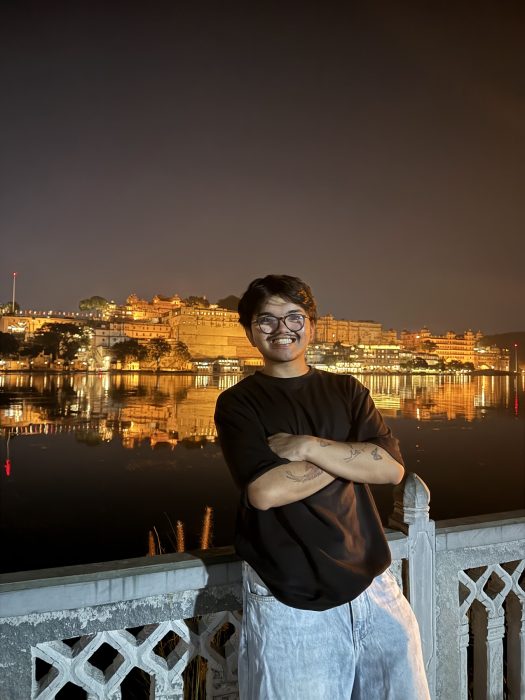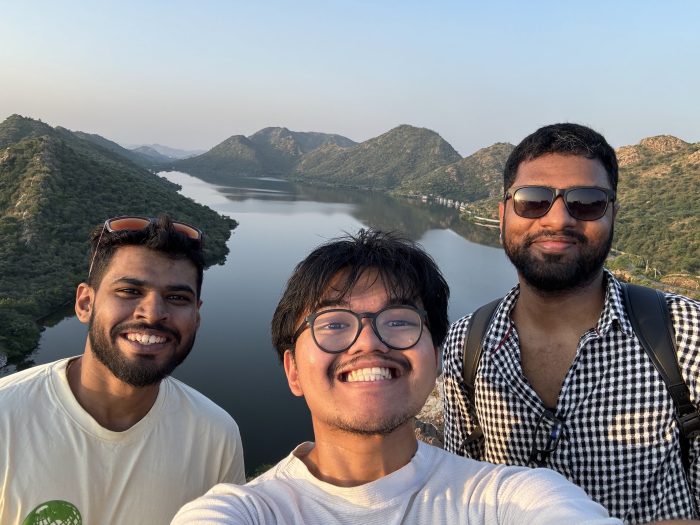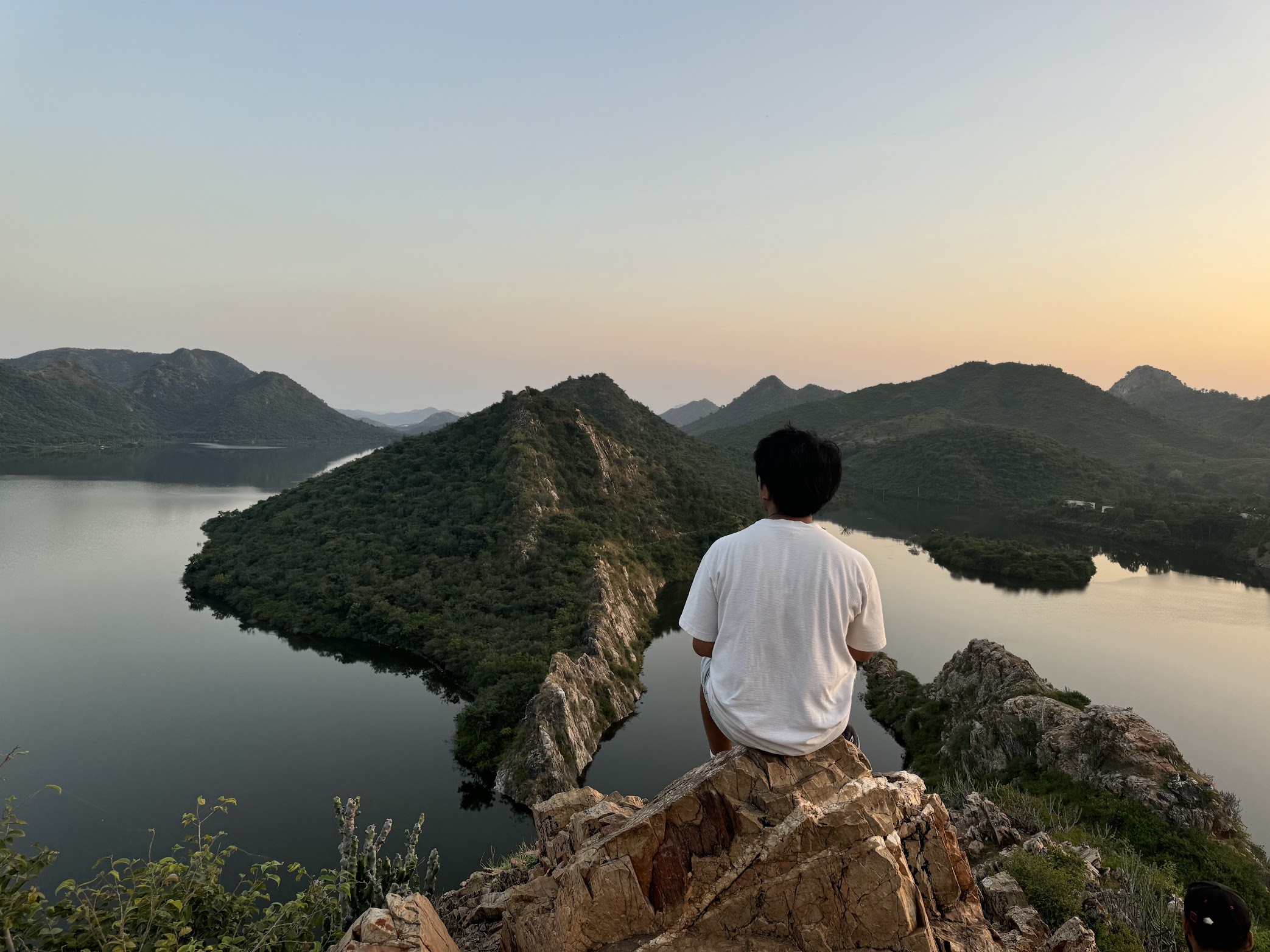Written by Keith, 2024 McCall MacBain International Fellow
Khamma Ghani! [‘many greetings’ in Rajasthani],
As I am sitting on the terrace of my homestay in Jaipur, thousands of kilometres from home, I find myself immersed in the vibrant heartbeat of the world’s most populated country—India. The journey has been a mix of challenges and personal wins, each day deepening my connection to these new cultures. Reflecting on these first few months, I can confidently say there’s no other country I would have chosen for this fellowship.
India, as I quickly learned, isn’t an easy destination for a beginner traveller like me. The first two weeks were intense as I navigated a vastly different way of life and faced countless moments of culture shock. Arriving in India was an eye-opener from the moment I stepped out of the airport. The roads were bustling with a chaotic mix of cars, tuk-tuks, and motorbikes, with little regard for road rules; each driver seemed to operate as though they were the only one on the road. This made crossing the street an adventure in itself—I nearly got hit two or three times in my first week.
Adjusting to the food was another challenge. As a Filipino, I was unaccustomed to मसालेदार खाना [spicy food]. While Filipino cuisine is a mix of sweet, sour, bitter, and salty, it lacks the intensity found in the land of spices. I eased myself into it, scanning menus and sampling dishes to build my spice tolerance at my own pace. I started with milder options like paneer makhani and eventually worked my way up to the regional specialties— dal baati churma, gatte ki sabzi, and laal maas.
Then came the scams. From paying eight times the regular price for a bottle of water to being charged a “foreign” fee for a tuk-tuk ride, I quickly learned to be cautious. And the most common question I’m asked? “Have you gotten sick yet?” Of course! Despite my best efforts to stay healthy, I experienced stomach aches, mild heat strokes, and my most persistent adversary—dust allergies. Being prone to dust allergies and choosing to live in a desert state probably wasn’t the wisest choice, yet here I am. Thankfully, my body eventually adjusted, and I no longer rely on allergy pills. I also arrived during monsoon season, which came with its own surprises. Even on seemingly sunny days, a sudden downpour would often leave me drenched.

Despite the hurdles and challenges I faced during my first weeks in India, I quickly found joy in living here, especially in the opportunity to immerse myself in its traditions. As a student of Asian Religions and South Asian Studies, I was most excited to experience firsthand the cultures I had only studied in class. Jaipur, also known as the Pink City of India, has proven to be the ideal place for this immersion with its rich history. The people of the Pink City hold tightly to their customs, and while the majority in Jaipur are Hindu, the city is also home to diverse religious communities, including Muslims, Sikhs, Christians, and Jains. One of my most memorable experiences was witnessing the arti ceremony—a beautiful Hindu ritual of prayer and thanksgiving to the deities. The atmosphere was mesmerizing, with music, movement, and devotion in the air, and I eventually joined in the dancing myself.
When I was staying in a hostel in Udaipur, a nearby city, I was invited to join a puja [a Hindu worship ritual] as part of the Diwali celebrations. Participating in these ceremonies, especially during such an important festival, was deeply enriching to my journey of cultural immersion. Having the chance to learn about religions different from my own has been incredible, and the openness and warmth of the locals have made it even more meaningful. Their welcoming spirit makes exploring and understanding their traditions feel natural, and they’re always encouraging of those who approach with curiosity and respect.
Speaking of learning, I’ve been studying Hindi for nearly three months now. The language has been challenging, especially since I had no background in Indo-Aryan languages. When I first arrived, I could manage only a basic नमस्ते [hello] and धन्यवाद [thank you]. Fortunately, I’ve had the support of excellent teachers, Rishi and Mukesh, from the Indian Lingua School of Languages. They gave me private lessons daily, guiding me through complex grammatical concepts and enhancing my conversation skills. With each passing week, I’ve become more confident speaking with locals. I can now order food in restaurants, direct rickshaw drivers, bargain in bazaars, and engage in casual conversations with new friends. After each class, I challenge myself to go out to the local markets and speak with shop owners, which has greatly helped me pick up the everyday vocabulary and expressions people use. Interestingly, because I don’t look too different from the locals, I’ve been able to use my appearance and growing Hindi skills to my advantage. At popular tourist sites like Jaipur’s forts, I approach the ticket counters confidently and say, “स्थानीय टिकट चाहिए” [need local ticket] instead of a foreign ticket—which can be ten times the price—and most of the time, it works! It’s incredible to see how quickly I’ve progressed, and I’m excited to continue my learning as I transition into my academic term.
One of the most important lessons I’ve learned in India is how deeply people here embody the philosophy of अतिथि देवो भव, which means “the guest is God.” Recently, I returned from a solo backpacking trip to Udaipur [India’s City of Lakes] and Jodhpur [India’s Blue City], where I had the chance to celebrate the Hindu Festival of Lights [Diwali] and my birthday! Setting off from Jaipur’s railway station was an adventure in itself. I arrived in the middle of the night to find hundreds of people bustling around—some waiting, others rushing to catch their trains. Between the honking cars outside, the hum of countless conversations, and people squeezing through every available space, I felt overwhelmed. The station signs were in the Devanagari script, which added to my confusion. Just as I was wondering how I’d find my train; a kind family noticed my uncertainty and guided me to my train just in time.

Once I arrived in Udaipur and Jodhpur, I stayed in hostels to meet other travellers. I was fortunate to connect with people from all corners of India, from Kerala in the South to Dehradun in the North, each bringing unique perspectives and stories that enriched my journey. Travelling through Rajasthan, I found constant reminders of Indian hospitality. Strangers stepped in to make sure shopkeepers gave me my change, new friends from a café invited me on mountain hikes, and a chef at a restaurant even invited me to join his family at the Diwali Mela—a vibrant celebration with cultural programs, games, food, and shopping. Even when language was a barrier, like when a tuk-tuk driver didn’t speak English, he made every effort to stop and ask locals for translation help, ensuring we found the way. India’s warm, hospitable spirit has made me feel that no matter where I am, I can always reach out for help if I need it.
I had some initial doubts about journeying to India, especially without previous fellows in South Asia to turn to for guidance. However, I genuinely feel that India is the perfect place for this fellowship. India’s beauty and diversity are astonishing, and I’ve barely scratched the surface. Each state feels like a different country, with its own unique culture and traditions. Every conversation, lesson, and adventure here pushes me to embrace discomfort and fuels my growth. I look forward to the experiences awaiting me in my academic and work terms, but for now, यह वर्तमान में जीने का समय है—it’s time to live in the present.
The McCall MacBain International Fellowships are open to undergraduate students of McGill University, University of Manitoba, Dalhousie University, and McMaster University, along with recipients of the McCall Huron County and MacBain Niagara Falls Scholarships studying at any Canadian institution. The Fellowships accept applications between October to January each year.

